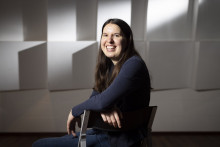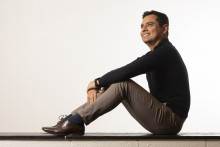‘My research analyses the impacts of armed conflict on local water management systems in the Middle East, specifically in Iraq, Palestine, Syria and Yemen. I look at, for example, how people come to agreements on access to water, how damaged infrastructure affects their access to water and so on. This is a crucial topic, in my eyes. Simply because people don’t stop needing water when conflict happens. A lot of research focuses on post-conflict periods, but not on what happens during. This is also due to practical issues. It is very difficult to get any data, let alone reliable data. It’s close to impossible to go to the field and talk to people during conflict. All of that makes it very hard to acquire funding for this type of research. But in the end there are still people drinking polluted water for years, because it is their only option. I work with a lot of local NGOs and humanitarian organizations. I hope that my research can help them with their work.
Juliane Schillinger
PhD research topic: The impacts of armed conflict on local water management systems in the Middle East
Works at: the Section of Governance and Technology for Sustainability within Department of Technology, Policy and Society at the Faculty of Behavioural, Management and Social Sciences (BMS)
Studied: International Land and Water Management at Wageningen University
Originally from: Germany
How I got to this topic? Water is cool! During my bachelor, I did a minor in hydrology and I went to a lecture on water politics. A small part of that lecture discussed how water can be used as a power instrument in conflicts and I immediately knew I wanted to learn more about that. I did my Master thesis on water governance and climate adaptation in the West Bank. I got to work in the field, which was fantastic, and I came back with a thesis and a lot of questions. That is why I knew I wanted to pursue a PhD. It seemed like the best way to get the answers I was looking for. I thought: if nobody else is doing this research, I guess I will just do it myself.
‘I was a science geek growing up’
I always wanted to be a scientist. I was a science geek growing up. At some point I wanted to be an astronaut, but who doesn’t? Apart from that, I always wanted to go into science. I studied natural sciences at first, then moved more towards engineering and now I somehow ended up with a PhD research in social sciences. Sometimes I miss hard sciences. I miss facts and numbers that always stay the same, no matter who tells them to you. Social sciences are a lot more complicated. However, I do find them extremely important. We can develop the most amazing technical solutions, but you need to know the socioeconomic circumstances of the possible solution, otherwise you can’t apply it.’

‘I’m in my fourth year of PhD. So far, it has been what I expected. It’s been pretty cool. I could go into the field and visit Palestine, I even went to the Gaza Strip. Field work was always the highlight for me, which is why the pandemic hit me quite hard in the beginning.
There have been a few challenges and realizations along the way, of course. Firstly, I’ve learnt that you can’t always trust data in this context – people supplying it might want to influence you or are influenced themselves. Moreover, some data just cannot be obtained in the middle of a conflict. You might not even have power to measure anything or get access to locations. The lack of data was the most challenging part of the whole PhD for me.
‘I’m not sure I want to stay in academia’
Secondly, I found out that there is a lot of competition in research. I’m very lucky, because I work in a small field where everyone collaborates. Perhaps because we work on such a dark topic. Even so, you always have to fight for funding. It took more than a year and some rejections to find money for my own research. In the end it was only possible thanks to a scholarship by the German Heinrich Böll Foundation.
Now I’m not sure I want to stay in academia. The issue of funding can be quite frustrating. Yes, I could switch and make my research broader, but I’m not sure that is the way to go for me. I could work for an NGO. I’d stick with research, but I feel it might be more practical and applied. In academia, you have to link everything to a theoretical framework, but what I want is to find practical solutions. There are so many human stories that just won’t fit into any theoretical framework.’
‘The most difficult step for a young researcher is the point when you realize you have to publish. You have to start writing and your work will be out there for the rest of the academic community to judge. Again, I’m lucky to work in a very cooperative field. Even though my last paper was rejected, I got a lot of constructive feedback, which will help me rewrite it. Most PhDs, however, get a very brief rejection. That can be extremely demotivating.
'The sense of community is very important for PhDs’
Overall I have enjoyed my PhD years. The community here at the UT is very nice. I’ve heard from many PhDs in Germany that their life and work is largely solitary. They mostly sit at home alone and work on their computer and maybe meet up with their supervisor once a year. My situation here is vastly different. I have an engaged supervisor and many PhDs around me. I think the sense of community is very important for PhDs. At some point, you will get frustrated with your research – for one reason or another. That is inevitable. At those moments, it really helped me to talk to other doctoral candidates. When they asked me about my research and I explained, their reaction was usually “That is so cool!” And then I suddenly realized again: you know what? It is cool!’








